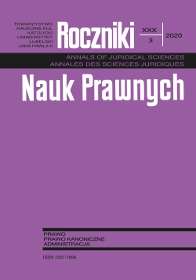Sankcje ustanawiane przez Radę Bezpieczeństwa ONZ a państwa nieczłonkowskie ONZ
Abstrakt
Celem niniejszego artykułu jest zbadanie, czy sankcje ustanawiane przez Radę Bezpieczeństwa ONZ (RB ONZ) wiążą nie tylko państwa członkowskie ONZ, ale również państwa, które nie są członkami Organizacji. Artykuł opiera się na tezie, że w Karcie NZ (KNZ) nie ma podstaw prawnych, które pozwalałyby RB ONZ na uchwalanie sankcji wobec państw nieczłonkowskich, jak również sankcje przyjmowane przez Radę nie są prawnie wiążące dla państw pozostających poza Organizacją. Udowodnienie tej tezy wymagać będzie w pierwszej kolejności krótkiego scharakteryzowania mechanizmu sankcji na gruncie Rozdziału VII KNZ. W drugiej kolejności zostanie przeanalizowana treść i znaczenie art. 2 ust. 6 KNZ. Po trzecie, zostaną omówione argumenty wskazywane w doktrynie i praktyce prawa międzynarodowego, przemawiające za związaniem państw nieczłonkowskich sankcjami RB ONZ. W końcu zostaną przedstawione przykłady relacji między państwami nieczłonkowskimi a Organizacją w zakresie realizacji sankcji ustanawianych przez RB ONZ.
Bibliografia
Aust Anthony: Modern Treaty Law and Practice, Cambridge University Press: Cambridge 2013.
Blum Yehuda Z.: Was Yugoslavia a Member of the United Nations in the Years 1992-2000?, „The American Journal of International Law” 101 (2007), nr 4, s. 800-818.
Caflisch Lucius: La Pratique Suisse en Matiere de Droit International Public 1990, „Swiss Review of International and European Law” 4 (1991), s. 513-580.
Cede Franz: The Purposes and Principles of the United Nations, [w:] The United Nations. Law and Practice, red. Franz Cede, Lilly Sucharipa-Behrmann, Kluwer: The Hague–London–Boston 2001, s. 11-24.
Conforti Benedetto: The Law and Practice of the United Nations, Brill: Leiden–Boston 2005.
Czapliński Władysław: Skutki prawne nielegalnego użycia siły w stosunkach międzynarodowych, Warszawa: Agencja Scholar 1993.
De Wet Erika: The Chapter VII Powers of the United Nations Security Council, OxfordPortland (Oregon): Hart Publishing 2004.
Dugard John: The Secession of States and Their Recognition in the Wake of Kosovo, „Recueil des cours” 357 (2013).
Falk Richard A.: The Authority of the United Nations to Control Non-Members, „Rutgers Law Review” 19 (1965), nr 4, s. 591-645.
Farrall Jeremy Matam: United Nations Sanctions and the Rule of Law, Cambridge: Cambridge University Press 2007.
Fassbender Bardo: The United Nations Charter as the Constitution of the International Community, Brill: Leiden–Boston 2009.
Fassbender Bardo: UN Security Council Reform and the Right of Veto: A Constitutional Perspective, The Hague–London–Boston: Kluwer Law International 1998.
Frowein Jochen: The United Nations and Non-Member States, „International Journal” 25 (1969-1970), nr 2, s. 333-344.
Goodrich Leland M.: Hambro Edvard, The Charter of the United Nations. Commentary and Documents, Boston: World Peace Foundation 1946.
Gowlland-Debbas Vera: Sanctions Regimes under Article 41 of the UN Charter, [w:] National Implementation of United Nations Sanctions. A Comparative Study, red. Vera Gowlland-Debbas, Leiden–Boston: Brill 2004, s. 3-32.
Grzywaczewski Tomasz: Ludowe republiki Donbasu – granice prawa do samostanowienia a fenomen quasi-państw, „Studia Prawnicze KUL” 2 (62) (2015), s. 77-106.
Kelsen Hans: Sanctions in International Law under the Charter of the United Nations, „Iowa Law Review” 31 (1945-1946), nr 4, s. 499-543.
Kelsen Hans: The Law of the United Nations: A Critical Analysis of Its Fundamental Problems: with Supplement, New Jersey: The Lawbook Exchange, Ltd. 2000.
Kleczkowska Agata: Karta Narodów Zjednoczonych jako światowa konstytucja – uwagi z perspektywy zakazu użycia siły, „Studia Prawnicze” 6 (2016), nr 207, s. 7-25.
Kosienkowski Marcin: Współpraca społeczności międzynarodowej z państwami de facto: Studium przypadków, Lublin: Wydawnictwo KUL 2018.
Krafft Mathias-Charles, Stadelhofer Julie-Antoinette, Thürer Daniel: Switzerland, [w:] National Implementation of United Nations Sanctions. A Comparative Study, red. Vera Gowlland-Debbas, Leiden–Boston: Brill 2004, s. 523-580.
Lis Edyta: Sankcje międzynarodowe a systemowy charakter prawa międzynarodowego, [w:] Państwo a prawo międzynarodowe jako system prawa, red. Roman Kwiecień, Lublin: Wydawnictwo UMCS 2015, s. 355-427.
Macdonald Ronald: The Charter of the United Nations in Constitutional Perspective, „Australian Yearbook of International Law” 20 (1999), s. 205-231.
Osteneck Kathrin: The Implementation of UN Economic Sanctions by the European Community, „Beiträge zum ausländischen öffentlichen Recht und Völkerrecht” 168 (2004), s. 517-571.
Proelss Alexander: Article 34, [w:] Vienna Convention on the Law of Treaties: A Commentary, red. O. Dörr, K. Schmalenbach, Heidelberg–Dordrecht–London–New York: Springer 2012, s. 605-643.
Ryszka Joanna: Praktyka stosowania sankcji międzynarodowych w ramach ONZ, „Kwartalnik Prawa Publicznego” 5 (2005), nr 3, s. 9-40.
Stahn Carsten, Zimmermann Andreas: Yugoslav Territory, United Nations Trusteeship or Sovereign StateReflections on the Current and Future Legal Status of Kosovo, „Nordic Journal of International Law” 70 (2001), s. 423-460.
Sutor Julian: Stosowanie sankcji prawnomiędzynarodowych, „Sprawy Międzynarodowe” 4 (1988), s. 83-92.
Symonides Janusz: Sankcje w prawie międzynarodowym, „Zeszyty Naukowe Uniwersytetu Mikołaja Kopernika w Toruniu – Prawo” 14 (1965), s. 35-55.
Talmon Stefan: Article 2 (6), [w:] The Charter of the United Nations: A Commentary, red. B. Simma et al., Oxford: Oxford University Press 2012, s. 252-279.
Tzanakopoulos Antonios: Disobeying the Security Council. Countermeasures against Wrongful Sanctions, Oxford: Oxford University Press 2011.
Widdows Kelvin: Security Council Resolutions and Non-Members of the United Nations, „The International and Comparative Law Quarterly” 27 (1978) nr 2, s. 459-462.
Copyright (c) 2020 Roczniki Nauk Prawnych

Utwór dostępny jest na licencji Creative Commons Uznanie autorstwa – Użycie niekomercyjne – Bez utworów zależnych 4.0 Międzynarodowe.


